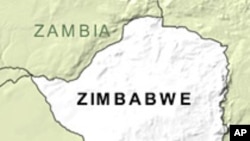Zimbabwe's Commercial Farmers Union warned on Wednesday that violence is escalating on white-owned commercial farms subject to takeovers even as a task force looking into such invasions was preparing to report to the government on its findings.
CFU President Deon Theron told an agriculture conference in Pretoria, South Africa, that farm invasions have worsened in Zimbabwe in recent weeks and that violence is rampant with more white farmers being forced out of their properties by supporters of the ZANU-PF party of President Robert Mugabe, who launched a land reform drive in 2000.
Set up by the unity government several months ago, the task force will present its findings Thursday to the Joint Monitoring and Implementation Committee, an adjunct to the unity government which is intended to review compliance with a 2008 power-sharing pact.
Led by Deputy Prime Minister Arthur Mutambara, the task force has compiled a damning report of chaos in the country's long-troubled agricultural sector, sources say.
CFU Chief Executive Officer Hendrik Olivier told reporter Ntungamili Nkomo of VOA's Studio 7 for Zimbabwe that the power-sharing government of President Robert Mugabe and Prime Minister Morgan Tsvangirai must step in quickly to halt farm takeovers and violence.
Mr. Tsvangirai's office, meanwhile, has taken issue with a report in the state-controlled Herald newspaper quoting Justice Minister Patrick Chinamasa as saying the Council of Ministers last week endorsed his controversial announcement recently that the country was pulling out of the Southern African Development Community's Namibia-based tribunal.
Minister of State Gorden Moyo, attached to the office of the prime minister, dismissed as inaccurate and misleading Mr. Chinamasa's statement, saying that the Council of Ministers in fact only agreed to abide by the decision of SADC heads of state in the matter.
VOA could not reach Chinamasa for comment on the controversy.
The Herald quoted Chinamasa as saying that the Council of Ministers, chaired by the prime minister, endorsed the move to pull out of the tribunal on grounds it was not yet operational because the protocol establishing it was not ratified by the two thirds of SADC members.
Government sources said Chinamasa's statements sparked a clash in Wednesday's Cabinet session between Tsvangirai and the justice minister. They said Mr. Tsvangirai told Chinamasa there was no consensus and that the matter was referred to the full Cabinet.
Mr. Tsvangirai was said to have told the justice minister that he was usurping the powers of Constitutional Affairs Minister Eric Matinenga, who would soon issue a statement.
Chinamasa insisted he had the power to make the decision but later conceded he had erred in saying the Council of Ministers ratified the pullout announcement.
The SADC tribunal in November 2008 heard a case brought on behalf of 77 white farmers and ultimately ruled that land seizures in Zimbabwe under land reform since 2000 were discriminatory and violated both Zimbabwean law and regional treaties.
SADC Executive Secretary Tomaz Salamao said Harare's move to repudiate the tribunal was referred to the justice ministers ministers of the SADC member nations for an opinion.
Tsvangirai spokesperson James Maridadi told VOA reporter Blessing Zulu that Mr. Tsvangirai believes Zimbabwe should consider itself bound by its international commitments.
Advocate Martin Dinha, ZANU-PF governor and resident minister for Mashonaland Central province, who has represented Zimbabwe at the Windhoek tribunal, said in an interview that Chinamasa was correct to have announced withdrawal from the forum.





